What’s Wrong With This Picture?
Wednesday, August 25, 2010
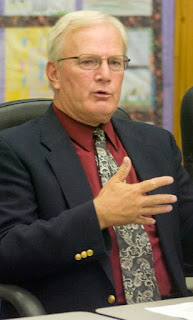 About 150 complaints made against students or employees of Albuquerque Public Schools from within and outside the system were scheduled for review by the APS Audit committee, chaired by Board Member David Robbins, left.
About 150 complaints made against students or employees of Albuquerque Public Schools from within and outside the system were scheduled for review by the APS Audit committee, chaired by Board Member David Robbins, left.
 About 150 complaints made against students or employees of Albuquerque Public Schools from within and outside the system were scheduled for review by the APS Audit committee, chaired by Board Member David Robbins, left.
About 150 complaints made against students or employees of Albuquerque Public Schools from within and outside the system were scheduled for review by the APS Audit committee, chaired by Board Member David Robbins, left.
Complaints are processed through an outside contractor, Global Compliance, to provide anonymity and supposedly protection from retaliation or retribution for bringing a complaint.
The program, known as Silent Whistle, is listed in the APS Student Handbook, on page 24, Fraud, Waste and Abuse Hot line (Silent Whistle): 1 (877) 874-8416 or abq.silentwhistle.com.
Ched MacQuigg and I attended, to document the committees' scheduled handling of the auditing of Silent Whistle complaints, that the committee is required to review.
Other board members present were Delores Griego, David Peercy, Lorenzo Garcia, and Robert Lucero. School Board President Marty Esquivel was on speakerphone for most of the meeting, but arrived during a closed executive session; Board Member Paula Maes was absent.
Over the years, I have documented through writing, photographs, audio, and or videoing, board and committee activities in the DeLayo-Martin Community Room at the APS building many times from all four corners and from all over the room.
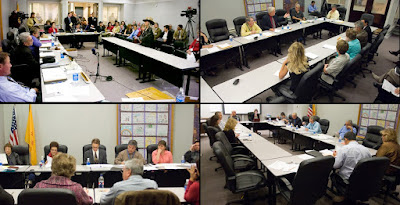 The photographs above, clockwise from upper left show the room from: the Southwest looking Northeast; the Southeast, looking Northwest, on August 25, 2010, the day of these events; the Northeast looking Southwest; and from the East looking West.
The photographs above, clockwise from upper left show the room from: the Southwest looking Northeast; the Southeast, looking Northwest, on August 25, 2010, the day of these events; the Northeast looking Southwest; and from the East looking West.
The room is not particularly conducive to large public meetings. It is a conference room with a number of tables arranged in an elongated rectangle. With the number of people it attempts to accommodate: board, superintendent, administrators, and staff there is scant room for any audience.
It was used as the board’s room before the room now used, the John Milne Community Board Room was remodeled.
I preferred to shoot from the Northeast corner, but recently board member Lucero, before leaving the board at the last election, took to sitting at the North end of the table rather than on the Westside. Lucero turned his back at an angle so it is difficult to see and photograph him. He is by far the most expressive member of the board and is sure to be emotionally demonstrative.
On this day, I set up my video tripod against the south wall behind Superintendent Winston Brooks where I had a good angle of all the board members and a fair angle of the Eastside of the table where presenters sit.
Brooks said he didn’t like anybody standing behind him; that I had to move.
“No knives, sir; no knives,” I told him.
Brooks said he didn’t want me to read his e-mails, off the large screened portable device in front of him.
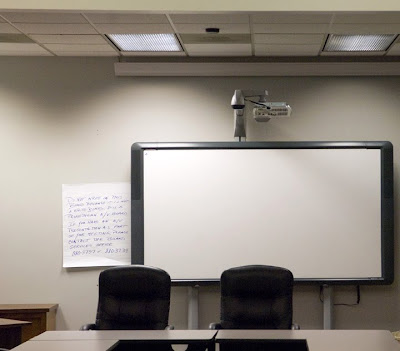 Committee Chairman Robbins told me I had to move because I was blocking their white board that they might use. I was not blocking the view of the board by the committee, but I moved to the southeast corner of the table almost blocking a citizen’s flip camera at the south end of the audience’s row.
Committee Chairman Robbins told me I had to move because I was blocking their white board that they might use. I was not blocking the view of the board by the committee, but I moved to the southeast corner of the table almost blocking a citizen’s flip camera at the south end of the audience’s row.
Our particular interest in the “Silent Whistle” program's audit item was scheduled late on the agenda.
Silent Whistle allegedly is designed so a contracted third party receives and records complaints against APS anonymously. However, once recorded the complaints are forwarded to APS administrators for review, investigation and to take appropriate action where necessary.
There are several inherent problems that immediately come to bear. In spite of the fact that the third-party contractor strips away the complainant's name and supposedly other identifiers to protect the complainant, the facts will remain. The name of the person accused in the complaint remains and at some point any investigator must interview the complainant and any other witnesses.
There is a real possibility that the same people who are involved in the original complaint sometimes do the internal review; making it appear that there is a conflict of interest.
In other cases, like MacQuigg’s, his complaint against Superintendent Brooks landed on Brooks’ desk for review. Brooks declared the complaint closed as a nuisance and that was the end of it as far as Brooks was concerned. Brooks has denied this, yet the complaint goes unsatisfied.
There is another fundamental problem; it comes in the form of due process. Just like in a criminal procedure, administrative due process also attaches. An accused is entitled to a fair process. They have a right to know what they are specifically being accused of, who made the complaint and at the end of the investigation, if they are found to have been involved in a violation of policy and face discipline, are entitled to know what evidence there is that may be used against them and they have an opportunity to provide any evidence the investigation did not uncover or reveal itself, which may be pertinent or might change the conclusion of the investigator or administrator overseeing the process.
If discipline is taken, the employee charged may appeal the action as a grievance. They are entitled to a just cause hearing in a neutral process. At that point the disciplined employee has a right to be confronted by their accuser and any and all witnesses against them and to cross-examine them and to see the evidence to be used to prove the case against them. They are also permitted to mount a defense, presenting their own witnesses and evidence.
The contention that “Silent Whistle” can keep a complainant's identity secret is pure myth.
In my reporting on this post, several APS employees indicated “Silent Whistle” is necessary because if a complainant's identity is made known, they face retaliation that could jeopardize their careers. If this concern is true, then the problem is a critical lack of management control in protecting employees from retribution or retaliation.
Beyond such anecdotal concerns, the mere fact that APS has “Silent Whistle” in place speaks volumes to the recognition of the possibility of a systemic failure of the Board, Superintendent, and administrative management's ability to protect their employees from retribution or retaliation.
Some of the people who have used “Silent Whistle” and are in fear of retribution or retaliation, mostly from principals, administrators, the superintendent, and even some members of the board. There is some evidence that there is retribution and retaliation and the fear of it is not misplaced.
The theory of “Silent Whistle” is not the solution, in fact it appears to provide cover for administrative management to not conduct fair and impartial investigations.
This is a common administrative management tactic, to claim that they are protecting the complainant's identity or privacy when they are simply hiding behind the theory to cover their own inactions or improper actions and by doing so fail to provide transparency.
The APS Audit committee’s duties include review of all “Silent Whistle” complaints and the topic was on the agenda with an executive closed session planned.
The Audit Committee reviews and recommends approval of action(s) associated with the District’s Annual Audit, any internal audit(s), audits associated with the Capital Outlay and Technology Committee and any whistleblower complaints. The Audit Committee will also include two non-Board/non-APS employees. The Finance Committee Chair will chair the committee. The non-Board/non-APS members, one of whom shall be a CPA, will be selected by the Audit Committee and approved by the Board. The non Board/non-APS Committee members shall serve two-year terms.
Though this link claims there is a newer renamed policy, I was unable to locate it, there is no suggestion that the text has changed, however.
MacQuigg contends there have been over 300 “Silent Whistle” complaints, none of which have been reviewed by the Audit committee.
 The Matthew O’Grady family was in the room to comment on the silent whistle complaints that daughter Caitlin O'Grady brought.
The Matthew O’Grady family was in the room to comment on the silent whistle complaints that daughter Caitlin O'Grady brought.
 The Matthew O’Grady family was in the room to comment on the silent whistle complaints that daughter Caitlin O'Grady brought.
The Matthew O’Grady family was in the room to comment on the silent whistle complaints that daughter Caitlin O'Grady brought.
Caitlin O'Grady graduated from Central New Mexico Community College with an associate degree in engineering, but could not opt out of an algebra class in order to graduate from Sandia High School.
Because of Caitlin O’Grady’s success in this dual program, she was featured in a CNM ad on the inside cover of the program for Governor Richardson’s higher education summit 2009: Transforming Higher Education Through Turbulent Times.
 Patriarch, Matthew O’Grady raised his hand and after several minutes Robbins addressed him saying this meeting was not one where public comments would be taken and it would be out of order to allow him to speak.
Patriarch, Matthew O’Grady raised his hand and after several minutes Robbins addressed him saying this meeting was not one where public comments would be taken and it would be out of order to allow him to speak.
The O’Gradys attended so they could participate in the committees' review of Caitlin O’Grady's particular silent whistle complaints. She has an absolute due process right, just as every other person who had filed a complaint had and she could insist that her complaint's audit review be conducted in public. It was clear that Robbins and the board members were not going to allow any public review. The board was only going to listen to the administrator's overall report without allowing it to happen in public.
However, the report from the “Silent Whistle” program was not ready for presentation and the agenda item was held to be rescheduled for a later meeting.

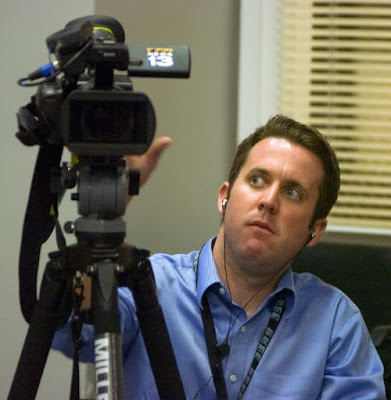 KRQE Reporter/Cameraman Ian Schwartz set up in the northwest corner; he was shooting a story about last year’s internal audit, which reported more than $176,470 in thefts, with laptop computers being the number one stolen items.
KRQE Reporter/Cameraman Ian Schwartz set up in the northwest corner; he was shooting a story about last year’s internal audit, which reported more than $176,470 in thefts, with laptop computers being the number one stolen items.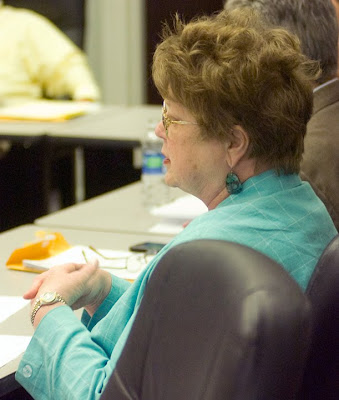 Schwartz aimed his camera at APS’ Director of Internal Audit Peg Koshmider across the table from the board.
Schwartz aimed his camera at APS’ Director of Internal Audit Peg Koshmider across the table from the board.The committee was at the point on their agenda where they were ready to go into an executive closed session under an exception to the open meetings act for the purposes of discussing limited personnel matters in connection with internal audits. They were going to review five non-compliant activity fund audits, 16 general operational/federal funds audits, and three audits/reports from: John Adams Middle School’s inventory, after school dance instructors, and a food services follow-up.
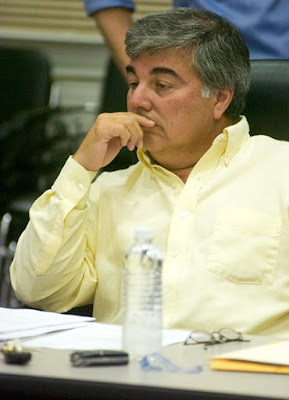 Lucero made a motion, after Schwartz vacated the space behind him, that I move my video camera to the northwest corner, where he said the press “traditionally” set up.
Lucero made a motion, after Schwartz vacated the space behind him, that I move my video camera to the northwest corner, where he said the press “traditionally” set up. NOTE:
NOTE:The reason a photographer selects a location to shoot from is dependent upon the story being told.
On this particular day, my story differed completely from KRQE's story. I was interested in what members of the Audit Committee might say, so I had wanted to shoot from the south end so I could see both the committee members and the staff making their reports.
When I was ordered away from Brooks, my default option was in favor of looking towards the board, not the staff.
Four years ago, when I attended my first APS Board meeting, the board met in this room because the current boardroom was being remodeled.
APS Attorney Melendres gave a report to the Board four years ago with a broadcast camera over his left shoulder. The KRQE TV camera was in the exact spot I had initially set up behind Brooks. The board at that time made no objection. Melendres is standing in the default position I took. To counter Lucero's statement of where the press “traditionally” set up, at this meeting, on January 4, 2007, the board was meeting in the smaller committee room and APS video cameras were set up in the corner Lucero calls the traditional location and the APS video team had a second camera along the east wall in the center aisle.
The chair asked me to move, but it wasn’t a request; it was a demand.
There was nothing wrong with where I was set up. It was a reasonable place to be. I was in no ones' way. I was next to a citizen who had a small flip cam set up on a tripod. The citizen was not asked to or required to move.
There was nothing wrong with where I was set up. It was a reasonable place to be. I was in no ones' way. I was next to a citizen who had a small flip cam set up on a tripod. The citizen was not asked to or required to move.
I protested that to move a second time limited my ability to reasonably cover the board.
Robbins ordered me to move to the northwest corner and immediately called an adjournment to clear the room for the closed session saying that the recording would be turned off.
IX. Adjourn to Executive Session pursuant to the Open Meetings Act NMSA 1978 (§10-15-1(H) (2)) for the purpose of discussing limited personnel matters in connection with Internal Audit (Discussion/Action)Robert Lucero motioned to move to executive session. David Peercy seconded the motion. A roll call vote was called to verify board member agreement to close the meeting and Lorenzo Garcia, Dolores Griego, Martin Esquivel, Robert Lucero, David Peercy, David Robbins, Don Moya and Winston Brooks answered in the affirmative. Paula Maes, Alan Gutowski and Demesia Padilla were not present for the voteThe motion passed. David Robbins asked that all electronic devices be turned off at this time.The committee adjourned to Executive Session pursuant to (§ 10-15-1 (H) (2)) for the purpose of discussing limited personnel matters in connection with Internal Audit: five non-compliant/partial activity fund audits, sixteen operational/federal funds audits and three audits/reports.
I took my video camera off the tripod and walked to the northwest corner of the table and pointed it at Lucero. Robbins ordered me to move the tripod, I ignored him, but in trying to be helpful, MacQuigg got my tripod and brought it to the northwest corner of the room.
 Lucero told MacQuigg to get out.
Lucero told MacQuigg to get out.
“Let’s throw them out,” Lucero told Robbins, as MacQuigg was walking by.
"What did you say," MacQuigg asked?
Lucero and MacQuigg exchanged a few words.
"Why don't you mind your own business," MacQuigg told Lucero.
 Lucero told MacQuigg to get out.
Lucero told MacQuigg to get out.
“... and lets eject them,” Lucero told Robbins
“I told you to turn off all recording devices,” Robbins said to me.
I exited the room without comment. I was not the last to leave, there were at least a half dozen others behind me; mine also wasn’t the last recording device that was running to leave the room.

 The two APS Police Officers: Sgt. Kim Murray and Officer P. Cadena, conversed, planning on how to expel MacQuigg and myself. They were concerned about the presence of the news media and sought advise by radio from their lieutenant.
The two APS Police Officers: Sgt. Kim Murray and Officer P. Cadena, conversed, planning on how to expel MacQuigg and myself. They were concerned about the presence of the news media and sought advise by radio from their lieutenant.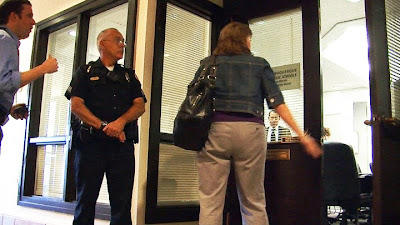 APS Communications Executive Director Monica Armenta stopped apparently to check with KRQE's Schwartz, to make sure he was getting everything he needed, for his story, because her subordinate, APS’ Director of Community Relations Rigo Chavez who had been at the meeting had left at the end of his work day, 5 PM.
APS Communications Executive Director Monica Armenta stopped apparently to check with KRQE's Schwartz, to make sure he was getting everything he needed, for his story, because her subordinate, APS’ Director of Community Relations Rigo Chavez who had been at the meeting had left at the end of his work day, 5 PM.
Armenta talked with Murray and Cadena for several moments, then left as that closed meeting was breaking up and the committee was going back into open session.
 I spoke with Murray, telling him, if my tripod was what was being considered to be in the way, I was going to sit in the audience chairs and handhold my video camera.
I spoke with Murray, telling him, if my tripod was what was being considered to be in the way, I was going to sit in the audience chairs and handhold my video camera. SIDEBAR:
SIDEBAR:Murray, with whom I’ve talked before, says he understands the First Amendment ramifications, but he has to follow orders so he can keep his job. It’s a recurring refrain among several APS officers who say the same thing. It’s not something that was so prevalent among APS officers who retired from the Albuquerque Police and Bernalillo County Sheriff Departments.
Upon returning to the meeting room, after about an hour long executive closed session was over, only three citizens who had waited reentered the room, including MacQuigg and myself.
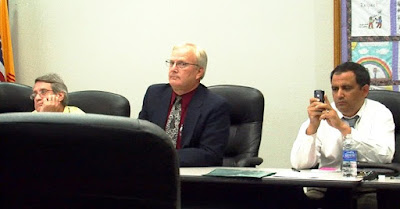 Before I could even place my cordless microphone on the table, Chairman Robbins, before calling the meeting back into session, said he was ejecting me for my not having followed his order to turn of my recording device.
Before I could even place my cordless microphone on the table, Chairman Robbins, before calling the meeting back into session, said he was ejecting me for my not having followed his order to turn of my recording device.
He then turned to MacQuigg and said he too was being ejected. MacQuigg said he didn’t have a recording device.
Robbins said he didn’t care; he was with this “group,” pointing to me, saying I was hostile.
"You violated the instruction of the State statute to turn off the recording device," Robbins told MacQuigg.
 The minutes of the meeting reflect:
The minutes of the meeting reflect:
 The minutes of the meeting reflect:
The minutes of the meeting reflect:XI. Statement of Closure
Mr. Robbins stated that the Audit Committee met in executive session on August 25, 2010, for the purpose of discussing limited personnel matters in connection with Internal Audit as authorized by the limited personnel matters exception -NMSA 1978,10-15-1(H) (2). The matters discussed in the executive session were limited only to those specified.
At this point, David Robbins asked two members of the public to leave the meeting for not turning off their recording devices in a timely manner and for disrupting the meeting.

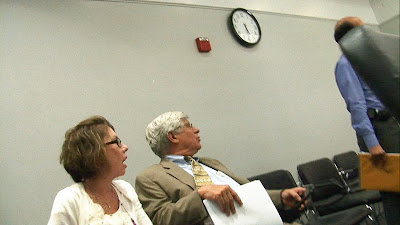 I objected to being ejected, suggesting Robbins ask APS’ legal counselor, Art Melendres, above center with Assistant Superintendent of Human Resources Andrea Trybus, left, to explain the meaning of the reasonable accommodation for audio and video recording of public meetings clause found in the State’s Open Meetings Act.
I objected to being ejected, suggesting Robbins ask APS’ legal counselor, Art Melendres, above center with Assistant Superintendent of Human Resources Andrea Trybus, left, to explain the meaning of the reasonable accommodation for audio and video recording of public meetings clause found in the State’s Open Meetings Act.
Melendres sat mute.
 ADDITIONAL NOTE:
ADDITIONAL NOTE:
 ADDITIONAL NOTE:
ADDITIONAL NOTE:Being moved to a location behind the board was unreasonable. A video should, at least, show what the public in the room sees. Being moved for the convenience of a board member who does not wish to be documented performing his public duties is a form of prior restraint – censorship.
 “We talked about this and you’re expelled,” Robbins said in trying to shut me down. His statement is critical and will be analyzed further, later in this post.
“We talked about this and you’re expelled,” Robbins said in trying to shut me down. His statement is critical and will be analyzed further, later in this post.
I challenged Robbins’ power to order our removal, suggesting that he did not have statutory authority to remove us; that authority belongs to someone else.
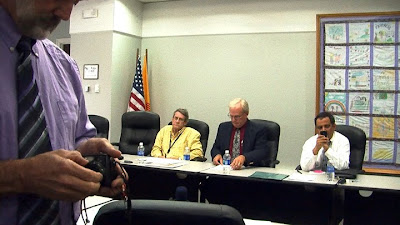 Esquivel began recording video of me on his cellular phone.
Esquivel began recording video of me on his cellular phone. MacQuigg went to collect my tripod from the corner and was shadowed by Murray.
MacQuigg went to collect my tripod from the corner and was shadowed by Murray. MacQuigg noticed Esquivel videoing me with his phone and photographed him causing Esquivel to: lower his phone, gesture, shooing MacQuigg away.
MacQuigg noticed Esquivel videoing me with his phone and photographed him causing Esquivel to: lower his phone, gesture, shooing MacQuigg away. “Both of you get out of here!” Board President Esquivel, right, said, gesturing with his thumb. "Now. Out!"
“Both of you get out of here!” Board President Esquivel, right, said, gesturing with his thumb. "Now. Out!"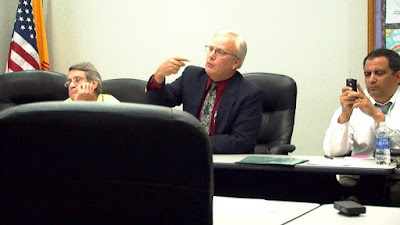
"If they refuse to leave," Robbins said, "arrest them."
 There were two people in the room who could be legally considered custodians of the building, Superintendent Brooks, and Chief Operations Officer Brad Winter.
There were two people in the room who could be legally considered custodians of the building, Superintendent Brooks, and Chief Operations Officer Brad Winter.
Winter, right, stood and instructed the officers to escort us from the building.
I have known Winter since high school days and as a City Councillor. I also provided photographs and video work for his mayoral run nine years ago, and again on his 2007 Council campaign and have been approached to photograph his reelection. I have not talked to him since the incident.
Many years ago, when I was still at the city, I spoke with Winter, in his role as councillor, about the state statute on “Interference with members of staff, public officials or the general public; trespass; damage to property,” which requires the "lawful custodian of the building, facility or property." to give the removal order, not a board chair.
I was attending a number of employee related hearings as a union official back then and there was some contention about using city security to eject people from City boards and commission meetings at the sole discretion of the chair or even some board member.
It was in fact the attempted enforcement of this very statute by city security by the Police Oversight Commission Chair Jill Marron, in an effort to silence me, which set in motion a series of events that caused me to be fired. After a year, the City approached me asking to mediate and settle with me. I had not threatened any legal action and was awaiting the final of four administrative and criminal hearings, the first three of which had been determined in my favor. The last hearing was before a personnel hearing officer. Based on the outcome of the three previous actions, the city folded.
I had researched this law quit extensively.
I had researched this law quit extensively.
As we started to gather up our equipment Robbins continued, threatening that if anything was left behind it would be confiscated and turned over to APD as abandoned property.Statutory Chapters in New Mexico Statutes Annotated 1978,Chapter 30 Criminal Offenses, Article 20 Crimes Against Public Peace, 30-20-13 Interference with members of staff, public officials or the general public; trespass; damage to property; misdemeanors; penalties.
After being expelled, according to the staff’s audio record, obtained through the inspection of public records request, Robbins took a single roll call vote on the action of three audits discussed in the closed session then made a personal comment:
Before I adjourn the meeting. This can go on the record. I was informed right after the last, after the governor’s debate that Mr. MacQuigg has been making statements derogatory and has implied that he has never done anything wrong and I also have information that he has made implied threats and for that reason alone I feel justified in removing these individuals because I consider them to be hostile and although that in and of itself does not allow us to remove someone when they have made threats against personnel of APS, I consider that against all our public staff and members of this board so, that can be on the record. I’ll adjourn the meeting.
 After being escorted from the building by Officer Cadena, we paused on the front walkway to discuss what had just happened. Cadena asked us to leave the property. We said we had left the building as Winter had ordered. Cadena said, I am now asking you to leave the property. He ultimately said if we did not comply he would, ”give you a lawful order.” I know what that game is, what he thinks is a lawful order probably wouldn’t hold up, but I had better things to do instead of going to jail, so we agreed to leave, rather than place Cadena in a position of giving an unlawful “lawful” order.
After being escorted from the building by Officer Cadena, we paused on the front walkway to discuss what had just happened. Cadena asked us to leave the property. We said we had left the building as Winter had ordered. Cadena said, I am now asking you to leave the property. He ultimately said if we did not comply he would, ”give you a lawful order.” I know what that game is, what he thinks is a lawful order probably wouldn’t hold up, but I had better things to do instead of going to jail, so we agreed to leave, rather than place Cadena in a position of giving an unlawful “lawful” order. So, What’s Wrong With This Picture?
So, What’s Wrong With This Picture?
Brooks said he didn’t want me to read his e-mails off the large screened portable device in front of him.
Brooks really didn’t want his e-mails read, maybe because APS did not provide all the documents, including communications to and from Brooks, through my inspection of public records request for documents held by APS on arranging the debate.
I was thrown out of the APS audit committee meeting, where all members of the board sit as a committee of the whole.
Being ordered to move twice, especially to a spot behind the board, where the members faces can't be seen, violates the open meetings act’s first paragraph:
10-15-1. Formation of public policy; procedures for open meetings; exceptions and procedures for closed meetings.
A. In recognition of the fact that a representative government is dependent upon an informed electorate, it is declared to be public policy of this state that all persons are entitled to the greatest possible information regarding the affairs of government and the official acts of those officers and employees who represent them. The formation of public policy or the conduct of business by vote shall not be conducted in closed meeting. All meetings of any public body except the legislature and the courts shall be public meetings, and all persons so desiring shall be permitted to attend and listen to the deliberations and proceedings. Reasonable efforts shall be made to accommodate the use of audio and video recording devices.
… [R]epresentative government is dependent upon an informed electorate.
An informed electorate comes in two ways; by attending meetings themselves or being dependent upon those willing to attend watch, record, and repot the activities of their government.
… (A)ll persons are entitled to the greatest possible information regarding the affairs of government and the official acts of those officers and employees who represent them.
The greatest possible information regarding the affairs of government comes from people who not only watch and report, but who ask questions and don’t accept flimsy answers, and demand proof in the form of inspecting records, documents and in interviewing those officers and employees who represent the citizens.
Reporting on how governmental actors react or respond to questions and requests for documentation is part of the greatest possible information to which the electorate is entitled.
Efforts by: board members, the superintendent, administrators, staff, or police to deny reasonable accommodation of devices to record audio, video, and still photography should be viewed as acts of misinformation to the electorate, especially when the government actors are in a position where the person informing the citizenry is prohibited from looking into their faces as they perform their official duties.
Robbins may, when lawfully done, call for and have the room to go into a closed meeting.
I left; I wasn’t the last one to leave the room. An interested citizen continued to record events until he exited the room behind me.
It took a few minutes to evacuate the room and I certainly did not delay the closing or impede anyone else’s departure.
However, Robbins also may not order that the recording devices of citizens be turned off; only that they must be removed from the room when they leave. The closed meeting wouldn’t convene until only those involved with the meeting are present.
Upon returning to the room at the conclusion of the closed meeting, Robbins immediately ejected me, saying it was because I had not obeyed his "order to turn off my recording device". He then went after MacQuigg, who had said nothing and was not part of the two exchanges I had with Robbins over his insistence at moving me around the room.
Audit Committee Chair Robbins had called for the staff’s official recording to be turned off; I did not turn off my camera because Robbins "order" cannot legally apply and Robert Lucero was still making remarks and threatening MacQuigg while the committee was going into their executive session and the room was clearing of the public and staff that had no role at the closed meeting.
With Robbins' words, “We talked about this and you’re expelled,” when put together with the comments made by Board Member Lucero, “Let’s throw them out, ... and lets eject them,” happening after Robbins recessed the open portion of the committee meeting to go into executive session. Any discussions or talk about expulsions, because they were not on the agenda, are illegal and invalidate the closed meeting.
With Robbins' words, “We talked about this and you’re expelled,” when put together with the comments made by Board Member Lucero, “Let’s throw them out, ... and lets eject them,” happening after Robbins recessed the open portion of the committee meeting to go into executive session. Any discussions or talk about expulsions, because they were not on the agenda, are illegal and invalidate the closed meeting.
Robbins unknowingly admits violating the Open Meetings Act, “Only those subjects announced or voted upon prior to closure by the policymaking body may be discussed in a closed meeting.”
 Chapter 10. Public Officers And Employees Article 15. Open Meetings N.M. Stat. Ann. §§ 10-15-1 to 10-15-4 (2003)
Chapter 10. Public Officers And Employees Article 15. Open Meetings N.M. Stat. Ann. §§ 10-15-1 to 10-15-4 (2003)
 Chapter 10. Public Officers And Employees Article 15. Open Meetings N.M. Stat. Ann. §§ 10-15-1 to 10-15-4 (2003)
Chapter 10. Public Officers And Employees Article 15. Open Meetings N.M. Stat. Ann. §§ 10-15-1 to 10-15-4 (2003)§ 10-15-1. Formation of public policy; procedures for open meetings; exceptions and procedures for closed meetings.
I. If any meeting is closed pursuant to the exclusions contained in Subsection H of this section, the closure:(1) …Only those subjects announced or voted upon prior to closure by the policymaking body may be discussed in a closed meeting; and….
J. Following completion of any closed meeting, the minutes of the open meeting that was closed or the minutes of the next open meeting if the closed meeting was separately scheduled shall state that the matters discussed in the closed meeting were limited only to those specified in the motion for closure or in the notice of the separate closed meeting. This statement shall be approved by the public body under Subsection G of this section as part of the minutes.
§ 10-15-3. Invalid actions; standing
A. No resolution, rule, regulation, ordinance or action of any board, commission, committee or other policymaking body shall be valid unless taken or made at a meeting held in accordance with the requirements of Section 10-15-1 NMSA 1978
 Winter instructed the officers to escort us from the building, not from the parking lot or off the property. When Cadena gave us “his” unlawful “lawful” order, he took from us our freedom, liberty, and several civil rights under the US Bill of Rights and the State’s Constitution’s. Rights, including our journalistic opportunity to document the reasoning that Robbins used to expel us in an on-camera/recorder interview. We did have better things to do, instead of going to jail, so we left.
Winter instructed the officers to escort us from the building, not from the parking lot or off the property. When Cadena gave us “his” unlawful “lawful” order, he took from us our freedom, liberty, and several civil rights under the US Bill of Rights and the State’s Constitution’s. Rights, including our journalistic opportunity to document the reasoning that Robbins used to expel us in an on-camera/recorder interview. We did have better things to do, instead of going to jail, so we left.
I sought an interview with APS School Board President Marty Esquivel.
He responded by e-mail:
Could you give me some more specifics as to what you're looking for and/or on need an interview about? Is it APS related or are you looking for something broader in terms of access to all public officials? I'm a little jammed up with cases, the election and my father who's been pretty sick.
I wrote back suggesting that instead of doing a face-to-face interview, he could take his time in answering four questions on what his take was on: access to public meetings, and public documents, and public officials barring, and removing media from public events?
Esquivel did not respond to the questions.

FINAL THOUGHT and OBSERVATION:
Prologue
The members of the APS School Board whom I've observed chairing meetings, be they President or Committee Chair: Marty Esquivel, Paula Maes, David Peercy, or David Robbins, (I have not observed the other board members preside over any meeting) clearly have no idea of how to run a meeting. They display a lack of having ever read or practiced either Robert's Rules of Order or any other similar formalized procedural rules for conducting business meetings, such as Mason's Manual of Legislative Procedures, Thomas Jefferson's Manual of Parliamentary Practice for use in the US Senate, or the Rules of the US House of Representatives.
Next Post: Part Seven September 1, 2010 APS BoardTheir failure to know and follow Robert’s rules, which is the procedures adopted by APS Board Policy, would have avoided the entire incident by cleaning up and approving the agenda at the start of the meeting. APS’ Director of Internal Audit Peg Koshmider knew that the “Silent Whistle” report was not prepared for delivery; it should have been disclosed so that members of the public present for a discussion might not waste their time for a listed agenda item that would not be hear.
Prologue


No comments:
Post a Comment